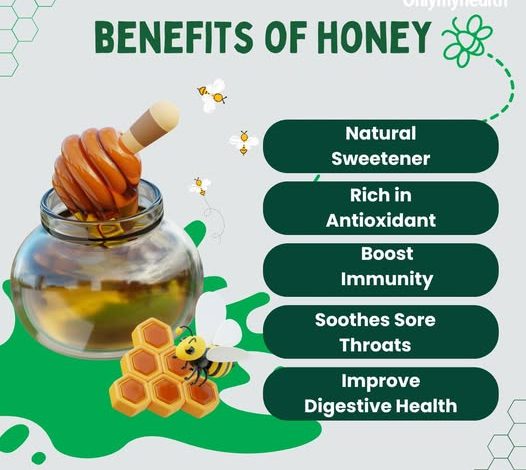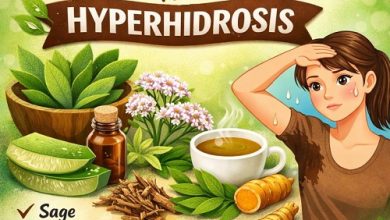10 Surprising Health Benefits of Honey You Didn’t Know: Sweet Medicine

Honey has been treasured for centuries—not only as a natural sweetener but also as a powerful healing agent. From ancient Egyptian tombs to modern kitchens, this golden liquid has carried with it a reputation for both taste and health. But beyond its obvious sweetness, honey hides a world of science-backed benefits that might surprise you.
In today’s fast-paced world, people often turn to supplements, over-the-counter medications, and synthetic remedies to maintain health. Yet nature has always provided us with potent tools, and honey is one of its most remarkable gifts. Whether you drizzle it over warm toast, stir it into tea, or use it as a natural face mask, honey is much more than just a pantry staple—it’s a sweet medicine.
We’ll dive deep into 10 surprising health benefits of honey you probably didn’t know, and why adding it to your daily routine can be one of the smartest decisions you make for your well-being.
1. Honey Boosts Your Immune System Naturally
One of honey’s most celebrated properties is its ability to strengthen the immune system. Honey contains powerful antioxidants such as flavonoids and phenolic acids. These compounds help neutralize harmful free radicals in the body, which can otherwise damage cells and weaken immunity.
Additionally, honey has natural antibacterial and antiviral properties. Some varieties, like Manuka honey from New Zealand, are particularly rich in methylglyoxal—a compound with remarkable antibacterial activity. This makes honey effective in fighting infections, soothing sore throats, and even reducing the severity of colds.
Quick Tip: Start your morning with a teaspoon of raw honey mixed in warm water with lemon. It’s a gentle detox for your body and a natural way to kick-start your immune defenses.
2. Honey Improves Digestive Health
If you’ve ever suffered from bloating, indigestion, or stomach discomfort, honey may be a sweet solution. Honey acts as a prebiotic, meaning it nourishes the good bacteria in your gut. These beneficial microbes play a key role in digestion, nutrient absorption, and overall gastrointestinal health.
Some studies have shown that honey can even help prevent conditions like gastric ulcers caused by the bacterium Helicobacter pylori. Its antimicrobial properties may reduce harmful bacteria while supporting the growth of healthy gut flora.
Did You Know? Honey is easier to digest than refined sugar because it contains natural enzymes that break down carbohydrates, making it gentler on your stomach.
3. Honey Heals Wounds and Burns
One of the most surprising benefits of honey is its ability to heal skin injuries. Long before modern antibiotics, honey was used in traditional medicine to treat wounds, burns, and cuts. Its antibacterial properties prevent infections, while its thick texture provides a protective barrier against dirt and microbes.
Honey also keeps wounds moist, which speeds up the healing process and reduces scarring. Clinical studies have even shown that Manuka honey dressings can significantly accelerate recovery in burn patients compared to standard treatments.
Real-Life Use: If you burn yourself in the kitchen, applying a thin layer of raw honey can provide instant soothing relief and aid healing.
4. Honey Soothes Coughs and Sore Throats
For centuries, honey has been a go-to remedy for coughs, colds, and sore throats—and modern research confirms its effectiveness. In fact, the World Health Organization (WHO) recommends honey as a natural cough suppressant.
Unlike over-the-counter syrups that may contain artificial ingredients, honey coats the throat, reduces irritation, and provides immediate comfort. A study published in Pediatrics found that giving children a spoonful of honey before bed was more effective at reducing nighttime coughing than some commercial cough medicines.
DIY Remedy: Mix honey with warm water and ginger or stir it into herbal tea for a soothing, immune-boosting drink.
5. Honey Provides a Natural Energy Boost
Forget energy drinks loaded with chemicals and sugar. Honey offers a natural source of quick energy thanks to its mix of glucose and fructose. Unlike processed sugar, honey’s natural sugars are absorbed at different rates—glucose provides a rapid energy spike, while fructose ensures a longer, sustained release.
This makes honey especially beneficial for athletes, gym-goers, or anyone needing an energy lift without the crash that comes from refined sugar.
Pro Tip: A spoonful of honey before your workout can help improve stamina and endurance. Pair it with warm water or spread it over a slice of whole-grain bread.
6. Honey Supports Heart Health
When it comes to protecting your heart, honey may be sweeter than you think. Research suggests that honey can help lower blood pressure, improve blood fat levels, and regulate cholesterol.
The antioxidants in honey reduce oxidative stress, which is linked to cardiovascular disease. Polyphenols in particular help relax blood vessels, improve circulation, and reduce the risk of blood clots.
Daily Habit: Swap your refined sugar for raw honey in tea, coffee, or desserts—it’s not only healthier but also promotes better heart health over time.
7. Honey Enhances Memory and Brain Function
Honey isn’t just food for the body—it’s nourishment for the brain too. Antioxidants in honey protect brain cells from damage, while its natural sugars provide an instant energy source for mental performance.
Some studies indicate that honey may improve memory and reduce the risk of age-related cognitive decline. In traditional medicine, honey has long been used as a tonic for mental clarity and concentration.
Brain Boost: Adding honey to warm milk before bed may enhance sleep quality, which in turn improves memory and learning abilities.
8. Honey Promotes Better Sleep
Struggling with insomnia or restless nights? Honey may be your natural answer. When consumed before bedtime, honey increases insulin levels slightly, which helps the brain release tryptophan. Tryptophan is then converted into serotonin and later melatonin, the hormone responsible for regulating sleep cycles.
This process makes honey a gentle, natural sleep aid. Unlike sleeping pills, it doesn’t carry risks of dependency or grogginess the next morning.
Bedtime Ritual: A teaspoon of honey in warm milk or chamomile tea is a soothing nightcap that supports restful sleep.
9. Honey Improves Skin Health
Honey isn’t just for eating—it’s a superstar in skincare. Thanks to its antibacterial, anti-inflammatory, and moisturizing properties, honey is a popular ingredient in face masks, cleansers, and lotions.
It helps fight acne by reducing bacteria and soothing inflamed skin. Its natural humectant properties draw moisture into the skin, leaving it hydrated and glowing. Regular use of honey masks can even reduce scars and blemishes.
DIY Beauty Tip: Apply raw honey directly as a face mask for 15–20 minutes, then rinse off with warm water. Your skin will feel soft, smooth, and refreshed.
10. Honey Acts as a Natural Remedy for Seasonal Allergies
Though research is still ongoing, many people swear by honey’s ability to reduce allergy symptoms. The theory is that consuming small amounts of local raw honey exposes the body to trace pollen, which over time may build tolerance and reduce seasonal allergy reactions.
While not a replacement for medical treatment, honey may provide mild relief from sneezing, congestion, and watery eyes.
Seasonal Hack: If you suffer from spring allergies, try incorporating a spoonful of locally produced honey into your daily diet.
Types of Honey and Their Unique Benefits
Not all honey is created equal. Here are some popular varieties and what makes them special:
- Manuka Honey (New Zealand): Famous for strong antibacterial properties.
- Clover Honey: Mild taste, versatile in recipes, and rich in antioxidants.
- Acacia Honey: Light and delicate, great for digestion.
- Buckwheat Honey: Dark, robust, and excellent for boosting immunity.
- Wildflower Honey: A mix of nectar sources, offering diverse benefits.
Choosing raw, unprocessed honey ensures you retain maximum nutrients and health benefits.
Precautions: When Honey May Not Be Safe
While honey offers incredible health benefits, it’s not suitable for everyone.
- Infants under 1 year old should never consume honey due to the risk of infant botulism.
- People with diabetes should monitor their intake carefully, as honey still raises blood sugar (though more slowly than refined sugar).
- Always choose raw, organic honey when possible, since processed honey often loses valuable nutrients.
How to Incorporate Honey into Your Daily Life
Adding honey to your routine is simple:
- Drizzle over yogurt, oatmeal, or pancakes.
- Stir into tea, smoothies, or warm milk.
- Use in marinades, salad dressings, or baking.
- Apply as a natural face mask or lip balm.
- Mix with lemon and ginger for a health-boosting tonic.
Conclusion: A Sweet Medicine Worth Embracing
Honey isn’t just a sweetener—it’s a natural medicine chest in a jar. From boosting your immune system and healing wounds to supporting digestion, sleep, and even brain health, honey has earned its title as “sweet medicine.”
In a world overflowing with artificial products and chemical-laden remedies, turning back to nature can often be the best choice. Honey is proof that sometimes the simplest solutions—drawn from nature’s own design—are the most powerful.
So, the next time you reach for a sweetener, consider swapping refined sugar for honey. Not only will you satisfy your sweet tooth, but you’ll also nurture your body with a golden elixir that has stood the test of time.




